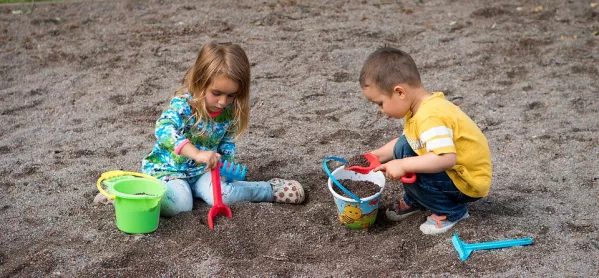A large-scale pilot of the proposed Reception baseline assessment is due to start in September - when schools will get the chance to try out the 20-minute test on their newest four- and five-year-old pupils.
The assessment of maths and literacy, to be taken in pupils’ first six weeks, is already controversial - with critics saying that it is “unnecessary”, “pointless”, “damaging” and “immoral”.
But headteacher unions have backed it, it has already been trialled in 300 schools and, if the pilot is successful, it will become statutory in 2020.
Details of how the test will work have been now been published. The assessment will consist of practical tasks using physical resources, such as counting plastic shapes, with an online scoring system that the teacher will complete.
And the design of the test may address some of the critics’ concerns.
In order to avoid demoralising children by repeatedly presenting them with tasks that they are likely to fail, a “routing” system will be used.
This means a pupil’s response in one task will decide what they do next. Teachers have also been told that the assessment can be paused and restarted - or stopped at any point if they think it is inappropriate for the pupil to continue.
While teachers (or teaching assistants) will be administering the assessment, they will only get back a “narrative statement” on how children have done - not the child’s score.
This “black boxing” of scores was recommended by the NAHT’s assessment review group. It may go some way to addressing concerns about labelling children by “ability” - something that UCL Institute of Education research for the National Education Union found is already happening in some nursery classes at the age of 3.
However, the changes made since the previous proposals for a baseline assessment are unlikely to allay two fundamental misgivings. The first concern is one of the most pressing issues in schools: workload.
While the government has pointed out that teachers already assess children “on entry”, the Reception baseline assessment will not give teachers the information they want.
Jan Dubiel, head of national and international development at early years training organisation Early Excellence, which devised the most popular version of the last attempt at a national baseline assessment, asked his followers on Twitter whether there was any similarity between the proposed baseline and the on-entry assessments that they already do - and 87 per cent of the 232 voters said there was not.
So it seems the baseline will not replace, but add to, the current assessments of children as they begin school.
But the government has said that it will look at reducing the workload involved in the early years foundation stage profile, which is carried out at the end of reception year - and it could also argue that spending 20 minutes per child at the beginning of their school life is a reasonable ask for the outcome required, judging how well state-funded institutions are educating children.
But that leads to the second misgiving: just what will the final progress judgement tell us? The NAHT supports it on the basis that progress measures are a better way of holding schools accountable than pure attainment measures - and it agrees that having a baseline assessment for measuring progress in Reception gives credit to the important work done in Reception and key stage 1.
But how will that credit be divided up? If, like Trigger’s broom with its 17 new heads and 14 new handles, the pupils, teachers and headteacher change during the seven years that are measured, is it still the same school? One poll found 73 per cent of primary school leaders felt the system was unfair.
The first progress measures are due to be published in 2027, so it seems that the biggest battle has simply been kicked further down the line.




